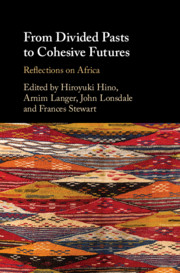Book contents
- From Divided Pasts to Cohesive Futures
- From Divided Pasts to Cohesive Futures
- Copyright page
- Contents
- Figures
- Tables
- Contributors
- Foreword
- Acknowledgments
- Introduction: Understanding Processes of Change in Social Cohesion: Learning from Comparative History
- Part I Social Cohesion in Africa: Case Studies of Past and Present
- 1 Kenya’s Four Ages of Ethnicity
- 2 Better Elections, More Deaths
- 3 Ethnicity, Citizenry, and Nation-Building in Tanzania
- 4 Identity, Inequality, and Social Contestation in the Post-Apartheid South Africa
- 5 Ethnicity, Development, and Social Cohesion in Africa
- Part II Policies and Institutions for Social Cohesion
- Part III Conclusions and Policy Recommendations
- Index
- References
2 - Better Elections, More Deaths
Nigeria
from Part I - Social Cohesion in Africa: Case Studies of Past and Present
Published online by Cambridge University Press: 05 August 2019
- From Divided Pasts to Cohesive Futures
- From Divided Pasts to Cohesive Futures
- Copyright page
- Contents
- Figures
- Tables
- Contributors
- Foreword
- Acknowledgments
- Introduction: Understanding Processes of Change in Social Cohesion: Learning from Comparative History
- Part I Social Cohesion in Africa: Case Studies of Past and Present
- 1 Kenya’s Four Ages of Ethnicity
- 2 Better Elections, More Deaths
- 3 Ethnicity, Citizenry, and Nation-Building in Tanzania
- 4 Identity, Inequality, and Social Contestation in the Post-Apartheid South Africa
- 5 Ethnicity, Development, and Social Cohesion in Africa
- Part II Policies and Institutions for Social Cohesion
- Part III Conclusions and Policy Recommendations
- Index
- References
Summary
This chapter accounts for the violence that occurred during the 2011 elections in Nigeria, despite their apparently being conducted relatively fairly. It points to long run structural horizontal inequalities, together with leaders’ short-term political ambitions as the basic explanations. The chapter points to seven different types of cleavages in Nigeria, the most important being between North and South, among the three main ethnic groups and majority versus minority groups. Major horizontal inequalities are recorded in every dimension. These inequalities are used by politicians to mobilise support. While institutional mechanisms were designed to moderate these inequalities in Nigeria – particularly in relation to political power and bureaucratic appointments - Jonathan Goodluck’s abandonment of zoning arrangements, which had brought him to power, and his use of patronage to garner support, led to violent protests in many places. Although evidence shows that the institutional arrangements to ensure power-sharing have tended to rigidify ethnic differences, the chapter concludes that they are nonetheless important mechanisms for integrating the country and avoiding large-scale violence. The 2011 violence illustrates what can happen when some power-sharing rules are abandoned.
- Type
- Chapter
- Information
- From Divided Pasts to Cohesive FuturesReflections on Africa, pp. 69 - 97Publisher: Cambridge University PressPrint publication year: 2019
References
- 17
- Cited by

